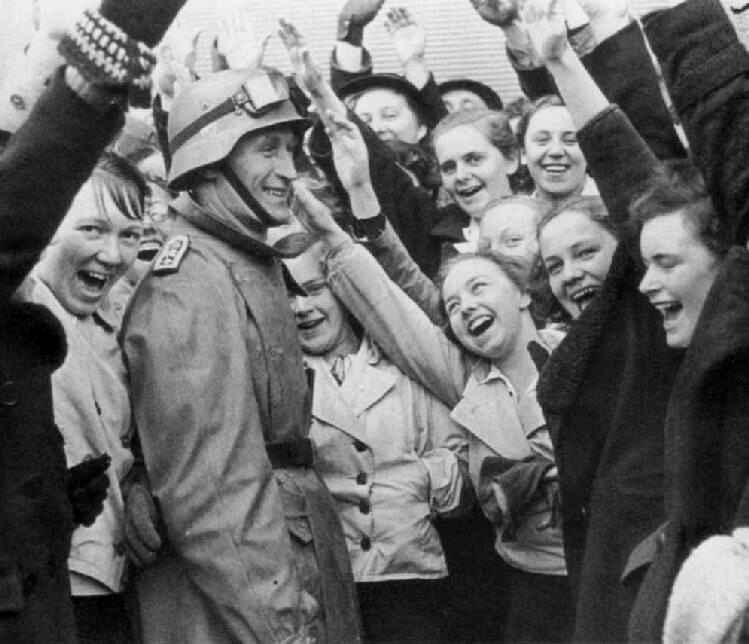 |
| Anschluss 12 March 1938. Austrian crowds greet the German army. |
I have translated some paragraphs from the as-yet untranslated posthumous collection of papers that would have formed the third volume of Márai's memoir Egy polgár vallomásai. I am not officially translating the book, nor am I translating closely or even in the order that passages appear in the book. Chiefly I want to get the sense across, editing for clarity and concision. It's a small selection from whatever strikes me. As to the title of the book from which I am now translating, Hallgatni akartam, I keep vacillating between I Wanted to Keep Silent and I Wanted to Keep Quiet. I am going with 'quiet' for now.
The title of the potentially three-volume memoir loosely translates as Confessions of a Bourgeois but that is not entirely satisfactory because polgár is not to be entirely rendered as bourgeois in the sense a revolutionary Marxist or Modernist might us it (as in "How very bourgeois!") . In fact no single word in English will quite do.
In one sense the word means simply citizen or commoner, someone with voting rights. In another it implies a member of the educated middle-class, in yet another it signifies someone who belongs specifically to the haute bourgeoisie. Márai uses the term in his fiction to describe industrialists, as well as scholars, authors and statesmen as distinct from, say, the working class, the aristocracy and the petty bourgeoisie. Everything he argues hinges on the word and what it means to him. It is what gives him identity, value, and a role in life. Education is clearly important to him, but no more so than culture generally, manners, and a sober sense of responsibility for the well-being of the nation. For Márai the polgár represents the enlightened and morally-burdened layer of society.
The entire memoir is predicated on the moment of the anschluss (12 March 1938), when Hitler marched into Austria and annexed it. It is the key incident of the book that opens the door to subsequent developments.
In the following passage Márai is accusing the increasingly fascist press of 1938 of whipping up the same hatred, primarily against Jews but also against his own middle-class that the bolshevik press was to do ten years later.
When the public feels entitled, without any proof ... to accuse someone of a vaguely conceived crime like being "against the people" or "against democracy" and when that accusation is quickly followed by notoriety so the accused is ground between the mills of the press and is in effect imprisoned or exiled without trial, the public is happy because this impersonal and therefore irresponsible game induces a sense of euphoria and offers satisfaction to its anonymous and powerless individual members...
....The day Hitler marched into Vienna the great majority of the Hungarian middle class felt sympathetic to nazi ideas... Hungarian peasantry had never been nazi and had no real sense of what the term meant. The people at the top - I don't mean the educated lower bourgeoisie, officials and military but the higher echelons of government - were chiefly frightened of the nazis and steered clear of them. The aristocracy, that is to say the historical landowning classes, were expressly and courageously against them (a number of them were to find themselves in the camps a few years later) and condemned nazism even when their feudal interests were at stake and the 'property-respecting' nazis seemed to offer some temporary hope for the feudal system itself. The significant number of Jews in post-Trianon Hungary - roughly a tenth of the population, were naturally terrified and turned away from nazism in disgust.
But the middle-class, that confused mass of society including the retired colonel's "genteel" wife who had been reduced to running a newsagents, the vet, the lawyer, the man with a small-time electrical business, the town councillor who was also a major in the reserves, the manager of the local tannery, all those who in Hungary might be called respectable members of society [Hungarian has nadrágos ember = literally "trousered folk"] were overwhelmingly, either openly or in secret, and by this time ever more openly, happy to confess themselves nazi sympathisers.
I have some other passages waiting and will follow this up tomorrow if there is time.

No comments:
Post a Comment